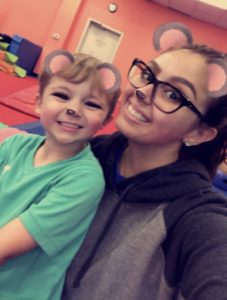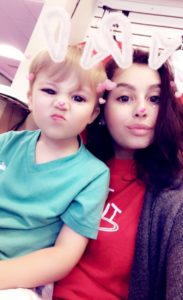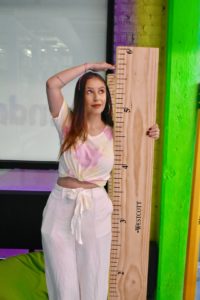We sat down with babysitter Daniella Cassoni of Chicago. We were excited to get to know her and hear about her experience as a child care professional.
 ABOUT DANIELLA
ABOUT DANIELLA
When did you start babysitting?
I’m half Brazilian—I was born in Boston and then I moved at around age 13 to Brazil and stayed there until I was 21. It was there that I had my first professional child care job in running an afterschool program. It wasn’t until I moved back to the U.S. that I really started pursuing more child care opportunities. I needed a job and everyone in my life had always been encouraging about how good I was with kids. So, I became a camp counselor and met families through the camp who I would nanny for periodically, as well as using sites like Sittercity to find many child care jobs.
When using Sittercity, what was your goal in finding a job?
Ever since I can remember, everyone would always say I had mother-like qualities and worked well with kids—plus I always enjoyed it. I believe I have a lot of patience, and I treat the children as if they were my own. I’m a very big believer in giving love and being affectionate. After I moved to Chicago, I was working at a bank. It wasn’t exactly working out, and I had a conversation with my partner and I decided that it was time to pursue what I was passionate about. So I went on Sittercity to try and figure out where in the child care world I could fit in. Not necessarily, as a long term career, but to see if it was for me, and how. Maybe it’s in a group setting, or maybe it’s one-on-one.
Have you found that you prefer a certain type of care over others?
Yes. I do enjoy sitting for children in more of a group setting, such as a camp. I like it because there’s some chaos involved. I like speaking to kids as if they were adults, so it’s interesting for me to see kids in group settings and where there’s more than one personality involved. It’s great to see all of the different opinions and views of the world that I get when I’m in this type of setting, as opposed to nannying or babysitting one-on-one. When it’s just me and one kid, I will try to meet other nannies at the park and have scheduled playdates to not feel so isolated.
Why do you like working with kids?
I think that they have a special way of looking at the world. It’s as if no one has imposed their views or opinions of the world onto them. I just think they are so pure in their views of things, and I love seeing the curiosity. Especially when you get into the ‘why’ phase. At the beginning it was like “oh my god, I’m not sure how many why’s I can take,” but then you think about it and you see that they’re literally just interested in knowing why someone is, for example, waving at you. A child doesn’t know that this is something imposed by society or being polite, they are just wondering why someone would wave to you, and you would wave back. So it’s just a different type of view on the world.
How do you think the children you’ve worked with would describe you?
Happy. Fashionista, because the last girl I sat with I would always put on cute outfits. I think they’d remember me as someone who was happy and someone that they felt safe with.
I have always believed that the first time you are meeting a family or interviewing a family for the first time, the most important person there is the child so I always try to put them first.
HOW SHE APPROACHES HER WORK
When you’re meeting a family for the first time, what do you do to make the children/family comfortable in the home?
I have always believed that the first time you are meeting a family or interviewing a family for the first time, the most important person there is the child so I always try to put them first. The parents and I will have questions, but that’s almost the second part of the meeting. I always try to get on their level (because I’m taller than them), and ask them their needs: what they like doing, do they have a favorite toy, etc. I like to interact with the child first because I believe that if the child is smiling and we’re both interacting, then we’re already off to a good start. After that, I’ll have a conversation with the parents and ask questions: what they like to eat, what do they like to do, do they have any allergies, or what I can help with. For example, the last child I sat for was not open to eating new foods, so we worked on that. But my big thing is to interact with the child. I think that’s the most important thing. If I’m keeping your child happy, safe, and we’re getting along, then we’re good to go.
When you’re interviewing with a family, what are some things that you’re looking for?
I like asking the basics first, such as the hours and what their expectations are of me. But I do like seeing how the parents interact with the kids. This will show me if we will be compatible as caregiver and parent. This is an important part of being a match. Like I was saying before, I am very lovable and affectionate as a caregiver and maybe there’s a family that doesn’t show this as openly. Since this is who I am, it may be difficult to be with a family that wasn’t on the same level in that manner. It’s also good to see basic interactions and how the parents react. If the child wants to watch TV, or grab a toy, or wants to eat something. One of these things are bound to happen while you are there!
Have you ever disagreed with a parenting decision, and what was the outcome of that?
The little girl I nannied for was 3-years-old, it was just her and her mom and her mom worked from home. The child was very attached to the mom and didn’t spend much time with kids her age. I made it clear to the mom that she would be starting school soon and was having a hard time preparing for that. The girl was worried that her mother wouldn’t pick her up at the end of the day, and was clearly scared. So, 2 weeks prior to starting school I suggested to the mother that it might be best to work downstairs in the lounge area or to leave the house during the day. This would set up a little more separation for the child to get used to and to have the conversations about mom coming back. In the beginning, I think the mother took it kind of rough—she didn’t really understand what I had meant and didn’t agree that she should try leaving. But I explained that it’s different for a child who is used to seeing their parent leave every day for work versus someone who doesn’t. We sat down and we talked about it afterward, and she understood my point of view. I believe she ended up taking it into consideration because then she started going downstairs for work or to take meetings. It was a little nerve-racking to have that conversation with the parent. I said that I didn’t want to overstep and whatever she thought was best. The parent ended up sleeping on it, and then I could see a shift in her thinking. We’re good friends now, and they were a great family—we still have dinner together to reconnect.
What piece of advice would you give to another sitter who had to approach a conversation regarding a difficult topic with a parent?
 It’s cliche to say, but I think you should just be honest and remember that your choice in words is also important. I think that when you let them know that they’re still the parent, but your position as a caregiver or nanny or babysitter is also to assist them in raising that child. Sometimes nannies and caregivers spend just as much or more time with the kids than the parents do. So it’s important for everyone to be on the same page. My strategy would be to just sit down and express that it’s in the best interest of your child that we’re both on the same page and it’s about communicating and connecting. Let them know that you’ve gotten to know their child and their family and that whatever the issue at hand may be, your approach should be taken into consideration.
It’s cliche to say, but I think you should just be honest and remember that your choice in words is also important. I think that when you let them know that they’re still the parent, but your position as a caregiver or nanny or babysitter is also to assist them in raising that child. Sometimes nannies and caregivers spend just as much or more time with the kids than the parents do. So it’s important for everyone to be on the same page. My strategy would be to just sit down and express that it’s in the best interest of your child that we’re both on the same page and it’s about communicating and connecting. Let them know that you’ve gotten to know their child and their family and that whatever the issue at hand may be, your approach should be taken into consideration.
What would you say is the most important thing for a healthy relationship between you and a family?
Open communication. Feeling comfortable in the environment, with the child, and having the parents comfortable with you. That one is hard!
 WHAT SHE THINKS
WHAT SHE THINKS
What is the number one thing you’ve taken from your experience as a babysitter?
Kids are our future—I know that’s cliche to say! But they are and it’s important that we’re being positive, affectionate, giving them love, and showing them the right direction. By assisting families in raising their kids in this way we’re making our future safe and these little people are prepared to make good decisions!
What is the most challenging thing you’ve encountered while caring for children?
Getting them to understand that we’re there to help, or that we’re not taking their mom or dad’s places. Sometimes I think they might think that we’re there to substitute, or impose something, or control them, per se. By teaching kids that I’m actually their friend, they don’t know me as the babysitter. And they do still see me as a friend or family. It is challenging when you do need to leave, or when you’re no longer there since it’s hard to explain, and some kids can take that hard.
I’m working on ‘tomorrow’ and focusing on what our ‘tomorrow’ will look like, and someone has to do it. We have an important role, not just a job, but an important role in the family.
What is it about nannying or babysitting that you think prevents others from seeing it as a ‘real job’?
I think that people don’t see it as helping raise their kids. I think that non-caregivers just don’t see that, and sometimes even the parents. The parents hired you and are paying you—so it’s a job, but there’s more to it than that. There are still real problems and real challenges that come with it. But I think it’s also on us (as a nanny or babysitter) to let people know the importance of this job. I’m working on ‘tomorrow’ and focusing on what our ‘tomorrow’ will look like, and someone has to do it. We have an important role, not just a job, but an important role in the family. If you’re there for the right reasons, that will be seen, and you’ll be able to express the importance of the role.
LIGHTNING ROUND!
Favorite kid food/snack?
Making muffins. I’m a muffin person.
Favorite book?
That one’s tricky—it’s not necessarily my favorite but it’s interesting. It’s called Feminist Baby.
Favorite movie to watch with kids?
Moana. She’s very independent and chasing all of her dreams.
A kid-related thing you never want to see or hear again?
Kid leashes
Most annoying thing a kid can do?
I appreciate their strong personalities, but I get very annoyed when they insist on things, like the obvious things.
What is your go-to rainy day activity?
Arts and crafts. I’m big on it and would have a box of it at the family’s house.
A Nickname you got from kids?
When I was younger, I had a kid who would always call me Ki-yee, and to this day I don’t know where it came from.
Your one wish for child care?
For society and families to see that having a sitter/nanny is an opportunity to have someone in their family with different views or cultural backgrounds and to expose your child to that. To take into consideration that who your child regularly spends time with matters in who they become as a person.


